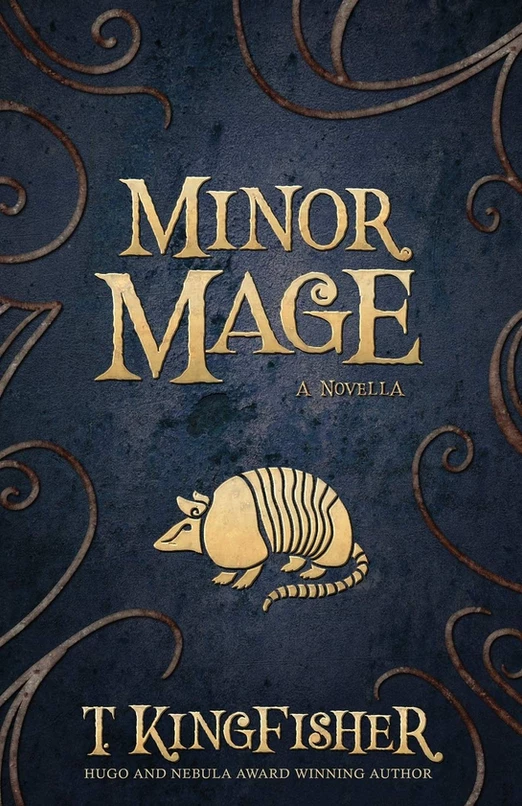Review by Joel Kreissman
T. Kingfisher’s “Minor Mage” is a fantasy novella for about a boy and his… armadillo. When an isolated farming village suffers a seemingly endless drought, the villagers feel they have no choice but to send their resident wizard, Oliver, on the dangerous journey to the Rainblade mountains to try and convince the Cloud Herders to bring back the rain. Problem is, Oliver is only twelve years old and, in the words of his smart-aleck armadillo familiar, a very minor mage. Still, the crowd of irate villagers are very persuasive, and so the young wizard and his familiar set out for the mountains and hope for the best. After escaping from a pair of bloodthirsty ghuls posing as farmers, they venture into a possibly haunted forest. There they meet their third traveling companion, a minstrel named Tresbastion who has a talent for making human remains into instruments that shriek the identities of their murderers, and is currently hiding from the last village he got chased out of.
At first, “Minor Mage” seems a fairly straightforward coming-of-age adventure story, but Kingfisher is good at subverting expectations. After it’s mentioned that Oliver’s mother is a retired mercenary you keep expecting her to come and bail out her little boy whenever things start to look hopeless for him, only for him to figure something out himself. From the mobs after both Oliver and Trebastion, you might pick up a bit of a “humans are the real monsters” message, but the mobs both have a central figure leading the rest. The grouchy miller in Oliver’s village, and the mayor Trebastion exposed as a murderer. This makes it more of a nuanced warning against being misled by forceful personalities. Kingfisher notes in the afterword that she considers “Minor Mage” a children’s book, though many editors were turned off by the amount of danger faced by a twelve-year-old. Having read it, I agree with her that the intended audience wouldn’t mind, and frankly compared to the YA novels I read when I was Oliver’s age, it’s really tame. About the most objectionable thing in this book might be Tresbastion’s description of making harps from the ribs and hair of murder victims, and it doesn’t actually show that.
I will note that Oliver isn’t your typical “inept mage”; he’s not incompetent; he just doesn’t know many spells and can’t muster the energy for a spell more powerful than some minor telekinesis or tying someone’s shoelaces together. And given his age and the fact that his mentor died before he could teach him many spells, it’s very understandable. So he’s forced to use the little magic he has creatively. A reminder to work within your own limits rather than striving for the impossible when the chips are down.
Overall, I’d call “Minor Mage” a nice short fantasy adventure that you can read through in a few hours, appropriate for both adults and young adults.
